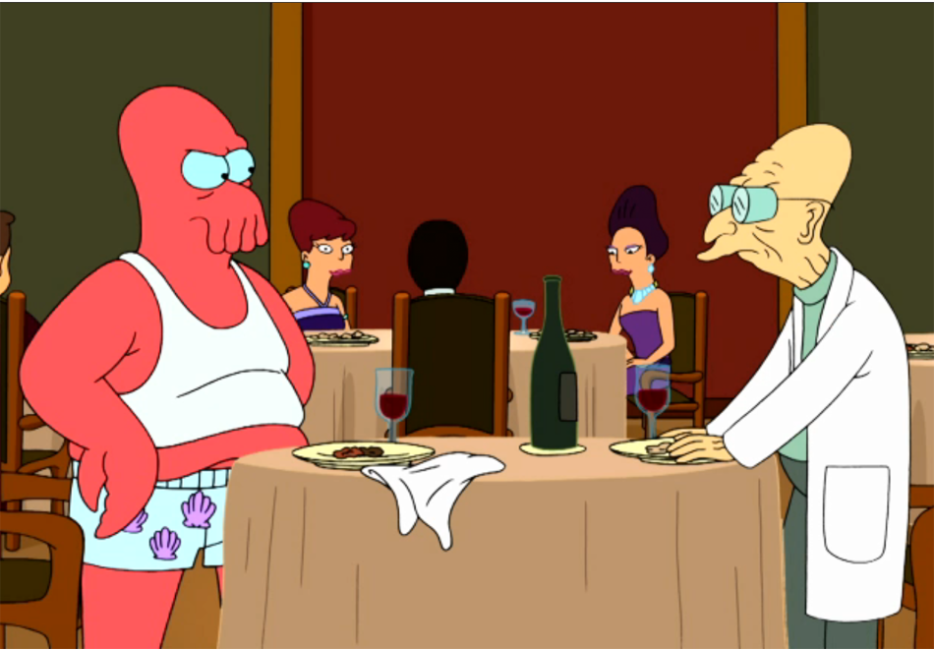As has pretty much been the case since it was resurrected on Comedy Central, the best moment of Futurama’s final season premiere last Wednesday, ironically, wasn’t a joke. As a foursome of our Planet Express crew debate the merits of staying in the two-dimensional space in which they’ve found themselves trapped, it suddenly occurs to them they no longer have digestive systems: without depth, see, your GI tract is just a bisecting line. They’ll need to get back into three dimensions or starve to death.
I have no idea what kind of bizarre hybrid degree in medicine and physics you’d need to find that bit funny. But, as someone whose job it is to find understandable ways of explaining complex concepts, there’s something absurdly elegant in summing up the differences between physical dimensions with something as simple as hungry characters; if physics textbooks were half as inspired, maybe we wouldn’t be facing engineer shortages.
Be that as it may, a Feynmanian knack for boiling down scientific concepts isn’t the world’s most stirring recommendation for a cartoon comedy series. Nor, really, is creating your own mathematical theorem for the purposes of resolving a farcical body-switching plot, as the show did for its sixth-season episode “The Prisoner of Benda.” Nor, exactly, is explaining atomic theory by reimagining your characters in an eight-bit video game and having them marvel at the fundamental building block of their universe, the pixel (although at least that one’s a joke, sorta). Unless, of course, you got the Feynman reference up top without clicking the link, in which case there might be a slowly spreading wet spot on your office chair right now.
As a nerd from back when “nerd” was an insult somebody could hurt your feelings with—and as a person whose only experience with a fake ID was using one to sneak into a Simpsons viewing party—Futurama stimulates something deep within my teenage/lizard brain, a low-grade but potent pleasure that has kept me connected well past a point of real enjoyment. As a comedy, even a cartoon one, it is annoyingly flat: where shows like Archer and Bob’s Burgers have managed to flesh out and deepen their characters among the laughs, Futurama has never entirely evolved past its first season (in, uh, 1999), when it was Matt Groening’s other gag-a-minute animated show.
Like The Simpsons, it’s occasionally capable of some genuine, heart-tugging sentimentality—“Jurassic Bark” is television’s Old Yeller climax, and even the show’s original finale, “The Devil’s Hands are Idle Playthings,” was uncommonly bittersweet. But, also like The Simpsons, its inability to be much more than a joke machine has left it lapped by the field. Even something as simple as the relationship between its main characters, Fry and Leela, is muddled, ranging from settled and mundane to unrequited pining from episode to episode. Futurama does have a wide comedic palette, ranging from downright Vaudevillian pun set-ups to recurring standards (the Professor’s “Good news” greetings) to occasional meta-mockery (the premiere had a running gag about a tough street punk who was unnaturally in touch with her emotions), but most of these are just floating free, punchlines that don’t even need the set-up of character.
What it does hold on to, though, are its stereotypically nerdy bonafides—which, really, aren’t even stereotypical so much as stereotypical-for-a-decade-ago: the show’s writing staff seems to have stopped nerdveloping a while back, so you’re more likely to see, say, a Gary Gygax cameo than George R.R. Martin. In the inspired cases, that leads to considering the practicalities of dinner in a two-dimensional world; in the majority, it leads to jokes like the Möbius drag strip, not even so much humour as an eyebrow twitch that indicates we both have a passing knowledge of undergrad math, a faded Far Side comic on a disused fridge in the cafeteria of a shuttered chem lab.
This isn’t all bad: it’s certainly not the sneering nerdface of Big Bang Theory, and dull assholes get an hour of more pandering and less intelligent Seth MacFarlane here’s-something-you’ll-recognize humour every Sunday on Family Guy and American Dad, so physicists may as well, too. But that doesn’t change the fact that far too much of the show is laziness dressed up in intellectual garb, as though emptily nodding towards Neils Bohr is at all different than doing it to B.J. & The Bear. It’s all just taking shared experience and turning it into a badge of honour, as baseless and dumb as the religious fundamentalism the show (naturally) likes to mock, happily letting group identification stand in for, well, pretty much everything.
Which is why the announcement that this will be the show’s final season feels merciful more than anything. As “nerd” has morphed from pejorative to insufferable self-descriptor, Futurama has gone from a show that could build impressive architecture out of its own pocket-protected influences into one that is happy to just point them out on a map until we all recognize that, yes, we are here. There’s something valuable in a show thought through enough to be a pedagogical aid, but the world has enough high-five sessions masquerading as something worthwhile. Ever since its return, Futurama has been too much of the latter.






